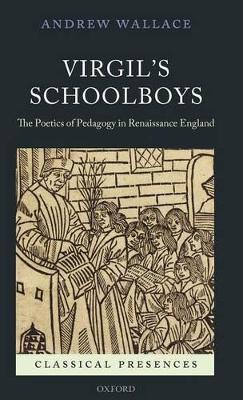Classical Presences
1 total work
Virgil's Schoolboys adds a new layer of complexity to Virgil's already complex pedagogical afterlife. Reading the ancient Roman poet as an adventurous theorist of instruction, Andrew Wallace examines the relationship between his serial meditations on teaching in the Eclogues, Georgics, and Aeneid, and the pedagogical theories and practices that dominated the spaces in which his poems came to be taught in the grammar schools of
Renaissance England. Wallace argues not only that Virgil was a keen student of the elusive operations of instruction, but that vitae and scholia from antiquity to the Renaissance preserve a broad range of fractured acknowledgements that pedagogical questions supply his poems with their characteristic intellectual texture. In grammar
schools all across Renaissance England 'the book of Maro' was a gateway to upper-form studies of the auctores. Even more significantly, it was a gateway to some of humanist pedagogy's most self-conscious meditations on the promise and fragility of the educational project.
Renaissance England. Wallace argues not only that Virgil was a keen student of the elusive operations of instruction, but that vitae and scholia from antiquity to the Renaissance preserve a broad range of fractured acknowledgements that pedagogical questions supply his poems with their characteristic intellectual texture. In grammar
schools all across Renaissance England 'the book of Maro' was a gateway to upper-form studies of the auctores. Even more significantly, it was a gateway to some of humanist pedagogy's most self-conscious meditations on the promise and fragility of the educational project.
